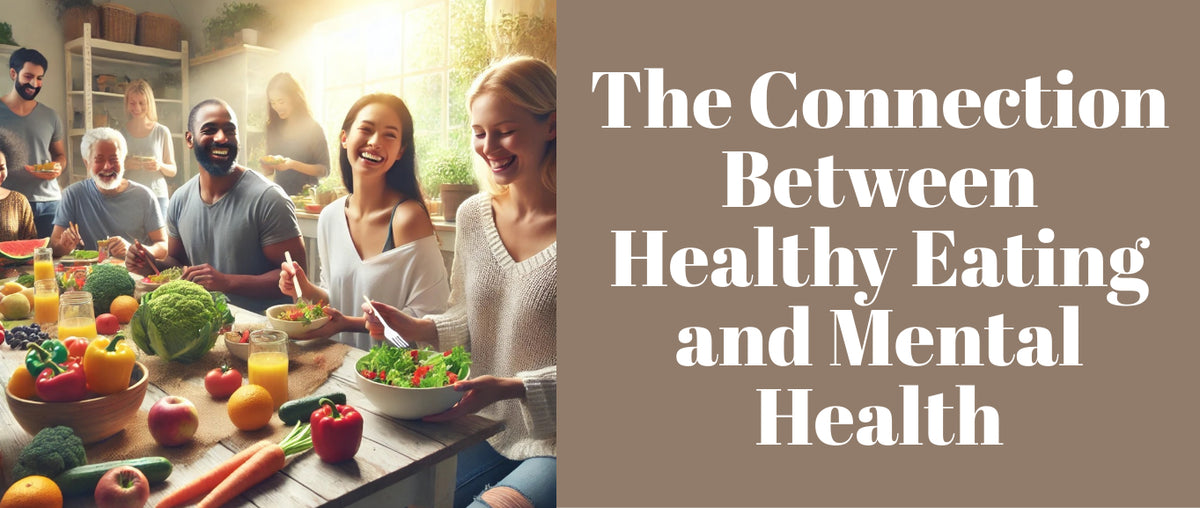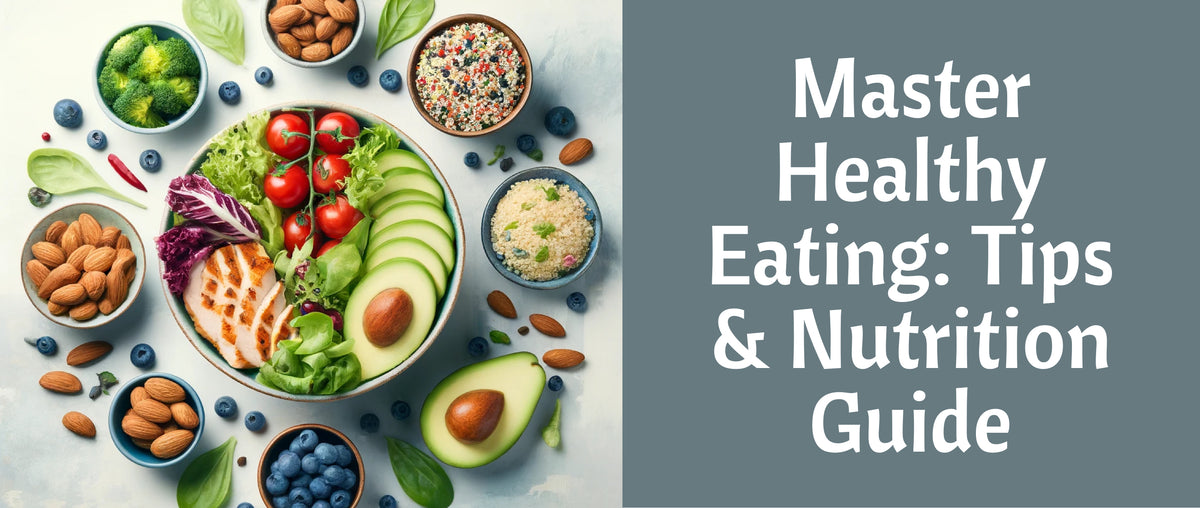The Connection Between Healthy Eating and Mental Health
Mental health is a crucial aspect of overall well-being, influencing how we think, feel, and act. It affects our ability to handle stress, relate to others, and make choices. Recent research has highlighted a significant connection between mental health and diet, suggesting that what we eat can profoundly impact our mental well-being. This comprehensive guide explores how healthy eating can enhance mental health, emphasizing the role of specific nutrients, foods, and dietary practices.
Key Takeaways
- Mental health is significantly influenced by diet and nutrition.
- Omega-3 fatty acids, antioxidants, and various vitamins and minerals play a crucial role in brain function and mood regulation.
- Processed foods, sugars, and artificial additives can negatively impact mental health.
- Maintaining a healthy gut is essential for overall mental well-being due to the gut-brain connection.
- Incorporating specific foods and nutrients into your diet can improve mental health outcomes.
Understanding Mental Health
Mental health encompasses emotional, psychological, and social well-being. It affects how individuals handle stress, relate to others, and make decisions. Good mental health is not just the absence of mental disorders but also the presence of positive characteristics such as the ability to manage emotions and maintain fulfilling relationships. Common mental health disorders include depression, anxiety disorders, bipolar disorder, and schizophrenia.
Common Mental Health Disorders
- Depression: Characterized by persistent sadness, loss of interest, and various physical and emotional problems.
- Anxiety Disorders: Include generalized anxiety disorder, panic disorder, and phobias, causing significant fear and worry.
- Bipolar Disorder: Involves extreme mood swings, including emotional highs (mania) and lows (depression).
- Schizophrenia: A severe disorder affecting thinking, feeling, and behavior, often leading to loss of touch with reality.

The Role of Nutrition in Mental Health
Overview of Nutritional Psychiatry
Nutritional psychiatry is an emerging field that examines how diet influences mental health. Research indicates that a well-balanced diet can prevent and treat mental health conditions. Conversely, poor nutrition can exacerbate mental health issues.
How Diet Influences Brain Function and Mood
The brain requires various nutrients to function correctly. These nutrients impact neurotransmitter production, brain cell structure, and overall brain health. Diets rich in plant based foods, cholesterol free foods , and High Protein Vegan Food can significantly enhance brain function and mood stability.
Nutrients That Boost Mental Health
Omega-3 Fatty Acids
Omega-3 fatty acids are essential fats that play a critical role in brain health. They are found in:
- Flaxseeds
- Chia seeds
- Walnuts
- Hemp seeds
Omega-3s are known to reduce inflammation and improve cognitive function, which can help alleviate symptoms of depression and anxiety.
Antioxidants
Antioxidants protect the brain from oxidative stress, which can lead to neurodegeneration. Foods rich in antioxidants include:
- Berries (blueberries, strawberries, raspberries)
- Dark chocolate
- Spinach
- Nuts and seeds
Antioxidants are crucial for maintaining mental health and preventing cognitive decline.
Vitamins and Minerals
- B Vitamins: Vital for brain health, B vitamins (B6, B12, and folate) help produce neurotransmitters and regulate mood.
- Vitamin D: Essential for mood regulation and overall brain health. Sources include sunlight, fortified foods, and supplements.
- Magnesium: Supports neurotransmitter function and reduces stress. Found in leafy greens, nuts, and seeds.
- Zinc: Important for brain health and immune function. Found in beans, nuts, and whole grains.
Foods to Include for Better Mental Health
Specific Foods Beneficial for Mental Health
- Leafy Greens: Spinach, kale, and Swiss chard are rich in vitamins and minerals that support brain health.
- Nuts and Seeds: Almonds, walnuts, flaxseeds, and chia seeds are excellent sources of omega-3 fatty acids and antioxidants.
- Berries: Blueberries, strawberries, and raspberries are packed with antioxidants that protect the brain.
- Legumes: Beans, lentils, and chickpeas are high in fiber and protein, which help stabilize blood sugar levels and mood.
Examples of Meals and Recipes
Sample Meals
- Breakfast: A smoothie made with spinach, blueberries, flaxseeds, and Oat Milk.
- Lunch: A salad with mixed greens, quinoa, chickpeas, and a dressing made with Unsalted Butter.
- Dinner: A stir-fry with tofu, broccoli, and bell peppers, served with brown rice and a side of Garlic Butter.
Foods to Avoid for Mental Health
Processed Foods and Their Impact
Processed foods often contain high levels of sugar, unhealthy fats, and artificial additives, which can negatively impact mental health. Examples include:
- Fast food
- Packaged snacks
- Sugary beverages
These foods can cause inflammation and disrupt neurotransmitter production, leading to mood swings and cognitive issues.
Sugars and Artificial Sweeteners
High sugar intake is linked to depression and anxiety. Artificial sweeteners, such as aspartame, can also negatively impact mood. It's best to avoid:
- Soda
- Candy
- Baked goods with added sugars
Instead, opt for natural sweeteners like honey or maple syrup in moderation.
Caffeine and Alcohol
While moderate caffeine consumption can enhance alertness, excessive intake can lead to anxiety and sleep disturbances. Alcohol, a depressant, can worsen mental health issues. Limit:
- Coffee
- Energy drinks
- Alcoholic beverages
The Gut-Brain Connection
The gut-brain axis is the bidirectional communication system between the gut and the brain. The gut microbiota plays a crucial role in this interaction, influencing brain function and mood. A healthy gut microbiome supports the production of neurotransmitters such as serotonin, which regulates mood. Foods that promote gut health include fermented foods like kombucha, kimchi, and sauerkraut, and fiber-rich foods such as fruits, vegetables, and whole grains. Maintaining a healthy gut can improve mental health and reduce symptoms of anxiety and depression.
Practical Tips for Incorporating Healthy Eating
Tips for Planning a Mental Health-Friendly Diet
- Plan Balanced Meals: Ensure each meal includes a balance of protein, healthy fats, and carbohydrates.
- Include a Variety of Foods: Incorporate different colors and types of foods to get a range of nutrients.
- Stay Hydrated: Drink plenty of water and Healthy Drinks like herbal teas and Kombucha .
Meal Planning and Preparation
- Prep Ahead: Prepare meals in advance to avoid relying on processed foods.
- Healthy Snacks: Keep high protein snacks like nuts, seeds, and fruit on hand to maintain energy levels.
Overcoming Barriers to Healthy Eating
- Budget-Friendly Choices: Opt for seasonal produce and bulk purchases to save money.
- Time Management: Use meal planning apps and schedule grocery shopping and meal prep into your routine.
Conclusion
A healthy diet is fundamental to maintaining good mental health. By incorporating nutrient-rich foods and avoiding processed, sugary, and artificial foods, individuals can improve their mood, cognitive function, and overall well-being. Prioritizing a diet rich in plant-based foods, cholesterol-free foods, and high-protein vegan foods can lead to significant mental health benefits.
Do you enjoy vegan food? We have a list of vegan restaurants in India to help you find delicious options in your area!










